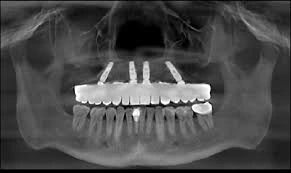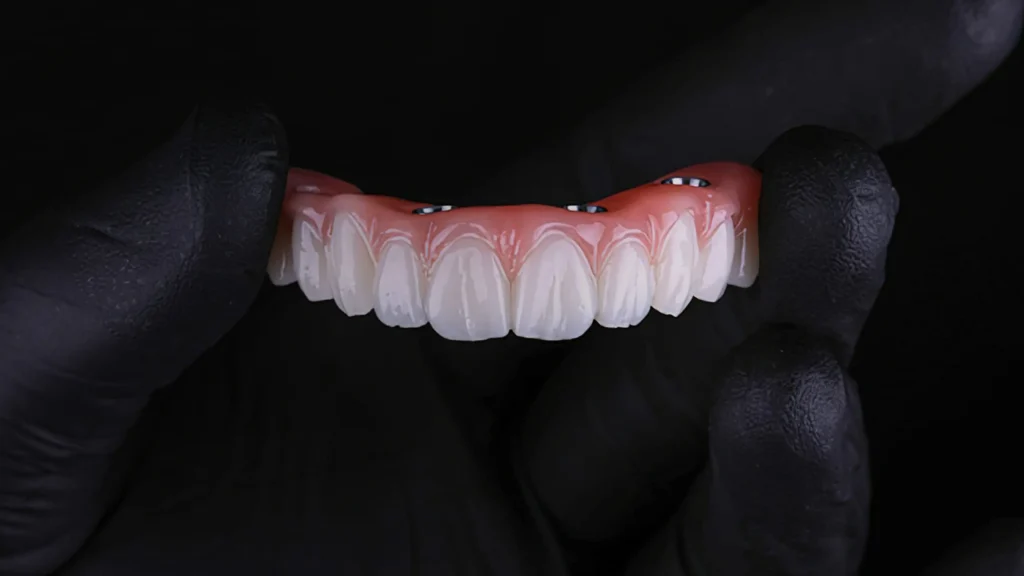If you have missing teeth, or you’re struggling with an ill-fitting denture that spoils your smile—or even hampers your ability to chew—you should consider dental implants.
Dental implants are truly an innovative solution, giving you firmly fixed teeth that function just like the real thing. What do you really know about them?
Today’s Prof Clinic article will give you a detailed guide, from their importance, the step-by-step procedure, and the different types, to who qualifies for them and how much they cost.
Let’s get started.
What is a dental implant?
Dental implant surgery is a medical procedure that replaces missing tooth roots by placing sturdy metal posts—most often titanium—into the jawbone.
These posts fuse biologically with the surrounding bone through osseointegration, creating a solid, stable foundation.
The integrated implant is then used to support an artificial tooth (a crown or bridge) that is shaped and engineered to mirror the natural tooth in both form and function.
The operation is carried out under local anesthesia and guided by sectional imaging—such as cone-beam CT—to ensure precision, and it requires a 3- to 6-month osseointegration period to secure the implant.
Also read: All-on-4 Dental Implants in Turkey: Cost & Advantages
Importance of dental implants
Dental implants do not focus on the aesthetic side alone; they also address health, functional, and psychological aspects. How does this importance manifest?
- Preserve jawbone density: The implant acts as a stimulus to the jawbone, preventing the recession and resorption that follow tooth loss and maintaining your natural facial structure.
- Stabilize the remaining teeth: It keeps your adjacent natural teeth from tilting or drifting toward the gap left by the missing tooth, preserving their alignment.
- Restore full chewing function: Dental implants let you regain the ability to chew food efficiently and without restrictions.
- Improve speech clarity: They help restore the natural articulation of sounds that may be affected by losing one or more teeth, especially the front ones.
- Natural, aesthetic appearance: The crowns are crafted to harmonize perfectly with the surrounding natural teeth, giving you a complete and attractive smile.
- Boost self-confidence: Implants spare you the embarrassment of tooth gaps or unstable conventional dentures, restoring your confidence in speaking, laughing, and eating.
- Durability and long service life: With proper oral care and regular follow-ups, implants provide a replacement solution that can last for many years.
- Protect healthy teeth: Unlike traditional bridges, dental implants do not require shaping or grinding down neighboring, healthy teeth to secure the restoration.
Also read: Dental Implants Without Surgery: Is It Possible?

Dental implant process
For a dental implant to succeed without any symptoms or future complications, it requires meticulous planning and specialized expertise. Discover the key steps of this procedure:
- Evaluation and diagnosis: A comprehensive oral examination is performed, and 3-D CBCT imaging is used to assess jaw-bone density and the condition of surrounding soft tissues.
- Surgical planning: The clinician devises a customized treatment plan that specifies the number of implants and their insertion angles based on your oral condition and overall health, taking into account factors such as gum health and systemic status.
- Implant placement: Under local anesthesia, a titanium fixture is inserted into the jawbone with high precision. This stage demands surgical skill to avoid sensitive structures, such as the inferior alveolar nerve—and ensure correct positioning.
- Osseointegration: The implant requires three to six months to fuse with the bone, creating a strong foundation capable of withstanding chewing forces. Strict oral hygiene and regular follow-ups are crucial during this period to prevent infection.
- Abutment placement: After the bone has healed, a metal abutment (connector) is attached to link the implant to the future crown. This step is carried out with care to ensure a perfect fit between components.
- Final crown placement: A custom-made crown—matched in shape and shade to adjacent teeth—is then permanently affixed. Before final installation, the crown is trial-fitted to guarantee your comfort and efficient chewing.
Also read: How Long Do Dental Implants Take in Turkey

Who Needs Dental Implants?
To be successful and free of symptoms or future complications, dental implants require precise planning and specialized expertise.
Here are the ideal candidates for this treatment:
- Patients seeking a fixed, stable restoration rather than removable dentures.
- Individuals with healthy, adequate jawbones (or those who can undergo bone augmentation).
- Those in good overall and oral health.
- Patients whose jawbone growth is complete.
- Non-smokers or former smokers.
Risks of Dental Implants
Although dental implant surgery is considered safe and successful in the vast majority of cases, it—as with any surgical procedure—can involve limited risks that require close medical monitoring.
These risks include:
- Infection: A bacterial infection may develop at the implant site if oral hygiene is neglected, leading to inflammation.
- Osseointegration failure: In rare instances, the implant may fail to bond properly with the bone, especially when risk factors such as smoking are present.
- Damage to sensitive tissues: Surgical trauma to nerves or the sinus cavity can sometimes occur during implantation, causing temporary numbness.
- Implant rejection: The body may mount an immune response and reject the fixture as a foreign object, although this is very rare with titanium implants.
- Mechanical complications: Issues such as fracture or loosening of the implant or crown due to excessive force can arise, necessitating corrective intervention.
It is essential to discuss these potential risks with your dentist before proceeding with treatment. At Prof Clinic, our specialist doctors evaluate your health, determine your suitability for dental implants, and explain the preventive measures taken to minimize these risks. Contact our team to request a free consultation.
Also read: Titanium Dental Implants: Cost, Pros & Cons

Types of Dental Implants
Dental implantology is diverse, with various types and techniques that suit different clinical scenarios and offer customized solutions for replacing missing teeth. Implants can be primarily classified into two main categories based on how and where they are placed in the jaw.
Endosteal
This is the most common and widely used type in modern dentistry. In this approach, a metal fixture is embedded directly into the jawbone itself, designed to act as an artificial root that integrates with the bone to become a permanent and stable component.
Mini Implants
These are dental fixtures with a diameter smaller than standard implants, specifically designed to secure fully removable dentures, especially in cases of moderate bone resorption where there is insufficient bone for conventional implants. They provide enhanced denture stability and improve patient comfort and chewing function.
Zygomatic Implants
A specialized solution for complex cases with severe maxillary bone loss, where long dental fixtures are anchored in the zygomatic bone rather than directly into the jaw. This technique allows for full upper-arch restoration without extensive bone grafting in this area.
All-on-4
Designed to replace an entire arch (upper or lower) using only four implants placed at precisely calculated angles in the front part of the jaw where the bone is denser. These implants serve as strong supports to secure a fixed bridge or full denture permanently.
Same-Day Implants
This technique enables the placement of a fixed (often temporary) prosthesis shortly after surgery, on the same day or the next day. It relies on achieving high primary stability of the implant in the bone immediately after placement to provide an instant aesthetic and functional outcome.
Subperiosteal
These implants are placed on top of the jawbone, directly beneath the gum tissue, as a custom-designed metal framework that conforms to the bone’s shape. They were once used as a treatment option for patients with severe bone loss who were not candidates for endosteal implants. With advancements in bone grafting techniques, subperiosteal implants have become rare in contemporary dental practice.

Dental implants cost
When looking at the price of dental implants, you’ll find it is affected by the implant type, the manufacturing brand, and the country of origin, as well as the scope of the restoration required (single tooth, full arch).
- Single implants (fixture + abutment without crown): Prices range from €300 up to €1,200.
- Zygomatic implants (for full-arch restorations): The cost for a single complete upper-arch zygomatic rehabilitation (4 implants + abutments + crowns) is €13,000, and the per-implant price is €2,500.
- Full-arch systems All-on-4: To restore a full arch with four implants and 12 crowns, prices range from €4,400 to €7,500.
- Full-arch systems All-on-6: Full-arch treatments with six implants and crowns start at €5,200 and go up to €10,000.
Thanks to our specialized team, advanced techniques, competitive pricing, and attractive offers, Prof Clinic is the ideal destination to restore your smile. Visit our clinic or contact us today for a personalized consultation and treatment plan tailored to your needs.
Also read: The Costs of Full Mouth Dental Implants
Prof Clinic is the best dental implant clinic in Turkey
At Prof Clinic, we are considered as one of the most prestigious, specialized destinations for dental implants in Turkey. We strive to deliver high-quality services and adhere to global standards for our patients.
Thanks to our team of experienced specialists and state-of-the-art technological equipment, we aim to achieve the best therapeutic and aesthetic outcomes. Many place their trust in our clinic to attain a healthy, attractive smile, making us a top choice for anyone seeking successful dental implants in Turkey.
We also offer personalized treatment plans and free initial consultations to ensure your implant journey is tailored to your needs. Contact us today to schedule your free consultation and begin your path to a confident smile in Turkey.
FAQs about dental implant
Are Dental Implants Painful?
The surgical procedure itself is performed under effective local anesthesia, making it essentially pain-free. You may only feel some pressure or vibration during the operation.
How does a dental implant work?
An implant works by inserting a metal root (usually titanium) into the jawbone to replace a missing tooth root. This artificial root integrates with the bone through osseointegration, forming a solid foundation on which the visible prosthetic tooth is secured.
How long do dental implants last?
Dental implants are designed as a long-term solution and, in many cases, can last for several decades or even a lifetime. Their longevity depends largely on good oral hygiene and regular dental checkups.
Is there a downside to dental implants?
Like any surgical procedure, dental implants carry potential risks such as infection or nerve injury—though these are rare. They also require a healing period and represent a higher financial investment compared to some other tooth-replacement options.
How painful is getting a dental implant?
Pain during the surgery is almost nonexistent thanks to the anesthesia. Once the numbness wears off, you might experience mild to moderate discomfort, which can be effectively managed with prescribed painkillers.
How much does it cost to get full dental implants in Turkey?
Full mouth dental implants in Turkey are significantly more affordable than in Western countries. Depending on the implant system and clinic, prices typically range from £2,400 to £6,800 for full-mouth treatments. For instance, All-on-4 implants per jaw start from approximately £1,600, while All-on-6 options begin around £3,000. Many clinics offer comprehensive packages that include consultations, temporary teeth, hotel accommodation, airport transfers, and medications.
Is it safe to go to Turkey for dental implants?
Yes, it can be safe if you choose a reputable, accredited clinic like our clinic. Turkey has become a leading destination for dental tourism, with many clinics adhering to international standards and employing experienced dental professionals.
Is it worth getting teeth implants in Turkey?
For many patients, the answer is yes. The cost savings are substantial—up to 85% less than in the UK or US—without compromising on quality. Many Turkish clinics, including Prof Clinic, offer advanced technology, skilled professionals, and comprehensive care packages.




